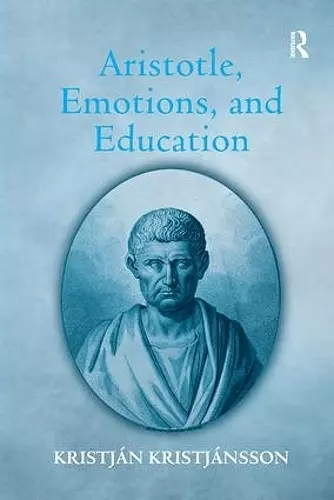Aristotle, Emotions, and Education
Format:Paperback
Publisher:Taylor & Francis Ltd
Published:11th Nov '16
Currently unavailable, and unfortunately no date known when it will be back
This paperback is available in another edition too:
- Hardback£150.00(9780754660163)

What can Aristotle teach us that is relevant to contemporary moral and educational concerns? What can we learn from him about the nature of moral development, the justifiability and educability of emotions, the possibility of friendship between parents and their children, or the fundamental aims of teaching? The message of this book is that Aristotle has much to teach us about those issues and many others. In a formidable display of boundary-breaking scholarship, drawing upon the domains of philosophy, education and psychology, Kristján Kristjánsson analyses and dispels myriad misconceptions about Aristotle’s views on morality, emotions and education that abound in the current literature - including the claims of the emotional intelligence theorists that they have revitalised Aristotle’s message for the present day. The book proceeds by enlightening and astute forays into areas covered by Aristotle’s canonical works, while simultaneously gauging their pertinence for recent trends in moral education. This is an arresting book on how to balance the demands of head and heart: a book that deepens the contemporary discourse on emotion cultivation and virtuous living and one that will excite any student of moral education, whether academic or practitioner.
'Kristján Kristjánsson has written a splendid book on education by way of understanding Aristotle and his treatment of the emotions and their cultivation. His analysis is insightful and well worth reading regarding any one of its three components, education, or Aristotle, or the emotions, but he artfully weaves the three themes together, always keeping in mind the central educational aims of the book. My own interest was especially peaked by his extended treatment and criticism of the mantra of 'emotional intelligence', with apt contrasts with Aristotle's much more impressive development of the idea that emotions are cognitively rich, steeped in ethics, teachable, trainable, and self-cultivatable. His discussion of anger (why one ought to teach justified anger in the classroom), for example, is both excellent and persuasive.' Robert C. Solomon, University of Texas at Austin, USA 'One of the most exciting recent developments in ethical theory has been the revival of an Aristotelian approach to understanding moral agency and association focused on the study of virtue and character. There can also be little doubt that his pioneering work in a wide range of prestigious philosophical and educational journals has established Professor Kristján Kristjánsson as a leader in the field of serious attempts to apply contemporary Aristotelian and virtue ethical scholarship to problems of educational philosophy and moral education. In this light, this welcome new exploration from Professor Kristjánsson of the diverse educational implications of Aristotle and virtue ethics clearly represents a major contribution to contemporary philosophy of education.' David Carr, University of Edinburgh ’Kristjánsson's book is well written... An especially strong interest in Aristotle or Aristotelian scholarship is not necessary to gain something from this study and the chapters on current philosophy of education are, I think, especially informative and interesting even if read indepen
ISBN: 9781138254077
Dimensions: unknown
Weight: 453g
204 pages